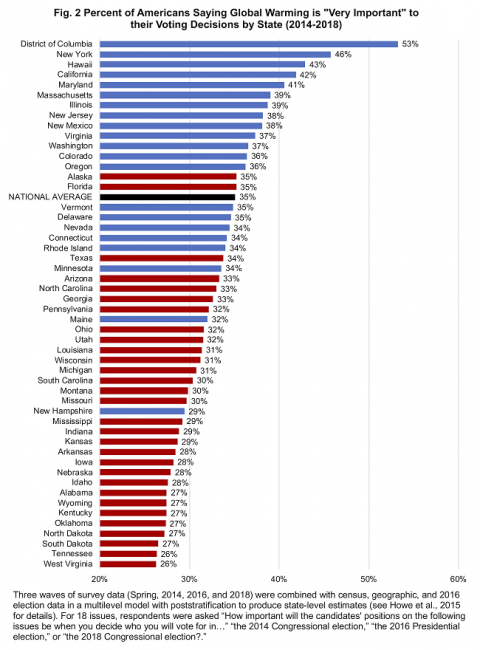Although Americans have recently become more worried about global warming, it is ranked lower in priority compared to other, more immediate and visceral issues. According to a recent Pew Research Centre poll, 46% of Americans said that climate change should be a top priority for the president and Congress relative to other issues like terrorism (73% of Americans), healthcare costs (68%), and social security (67%).
A similar pattern appears to have emerged in a recent research on American public opinion by the Centre for Climate Change Communication, George Mason University in Fairfax, Virginia.
Out of 28 different issues registered voters say will influence their vote for Congress in 2018, global warming ranked 15th in importance (Fig. 1). Nearly four out of 10 Americans said that a candidate’s position on global warming will be very important to them when deciding whom to vote for in the 2018 Congressional election.

The low priority ranking of climate change is said to be partly due to the human tendency to prioritise current risks and discount future threats. As a result, despite the heroic efforts of many scientists, activists, politicians, and other advocates, across the globe and in the U.S. in particular, “policies are lagging very, very far-miles, miles, miles behind the science and what needs to be done,” according to Nobel prize-winning economist William D. Nordhaus.
Americans’ political ideologies and partisan affiliations, however, have a strong influence on how they view climate change. The Pew Research Centre poll above found that 68% of Democrats – as compared with only 18% of Republicans – said that climate change should be a top policy priority. Similarly, the George Mason University 2018 research found that, among registered voters, global warming was ranked as the fourth most important issue to the voting decisions of liberal Democrats while it was ranked as the least important out of 28 issues by conservative Republicans.
Using the models underlying our Yale Climate Opinion Maps, clear differences emerged between red and blue states (that is, voted Republican or Democratic in the 2016 presidential election). On average, blue state residents are much more likely than those in red states to say global warming will be important to their voting decisions, with a few exceptions (Fig. 2).
For instance, red states Alaska and Florida hover around the national average. In Alaska, climate change has caused flooding and permafrost melting, which is damaging roads, buildings, airports, railroads, and pipeline infrastructure. One study estimates these damages will cost $5.5 billion by 2100. In Florida, “a wealth management company worth $1.5 billion is advising customers that South Florida’s real estate market might be a risky place to invest” due to sea level rise. More severe hurricanes and harmful algal blooms may also be a factor.
Anthony Leiserowitz, Director of the Yale Programme on Climate Change Communication, said in a recent Los Angeles Times article, “This is not just a political issue anymore in some places… voters are seeing the consequences (of warming) right here, right now.”

In addition to Washington DC, where global warming ranked 8th in voting issue importance, New York (11th in ranking), Hawaii (9th), and California (13th) top the list of states where the issue is most highly ranked. Greater exposure to coastal storms, wildfires, and other extreme events is likely influencing residents’ opinions in these states. The Yale Climate Opinion Maps show Washington DC and New York also have the highest population percentages who believe that global warming is affecting the weather (75% and 71%, respectively).
Residents in these states also talk about global warming more than those in most other states. By contrast, just over a quarter of Americans say global warming will be important to their voting decisions in Alabama (17th in issue importance ranking), Kentucky (16th), and West Virginia (17th) – the same red states where residents are less likely to talk about global warming and hear about it in the media.
Although many Americans rank global warming as a relatively low priority voting issue, the more general issue of environmental protection is a higher voting priority: about half of registered voters say that a candidate’s position on protecting the environment will be very important to their vote (Fig. 1).
Given that many existing environmental problems, as well as the economy, public health, and community infrastructure, will be impacted by climate change, it is important that Americans understand the connections. A warmer climate means more severe weather, increased stress on most species, less fresh water, more acidic oceans, and less permafrost. In contrast, a rapid transition to clean, renewable energy sources would provide cleaner air, improve public health, and provide economic opportunities along with many other co-benefits beyond reducing climate change. Many climate solutions actually have bi-partisan support, an important fact that is greatly overlooked in the current era of extreme political partisanship.
As more Americans come to better understand that many environmental, health, and economic impacts of climate change are interrelated – and as the costs of clean energy continue to drop – it is likely that the issue will become a bigger voting priority in the public.
